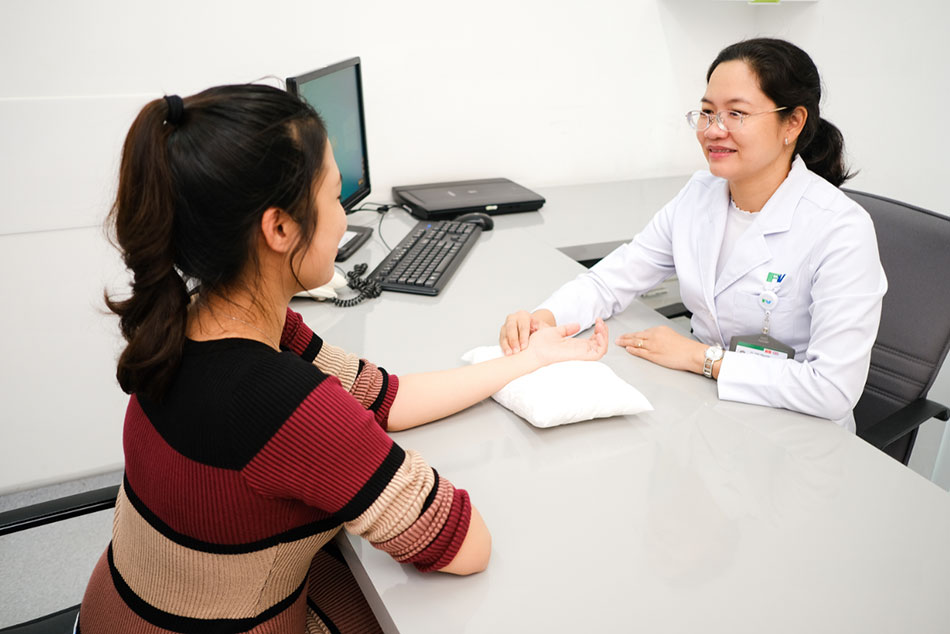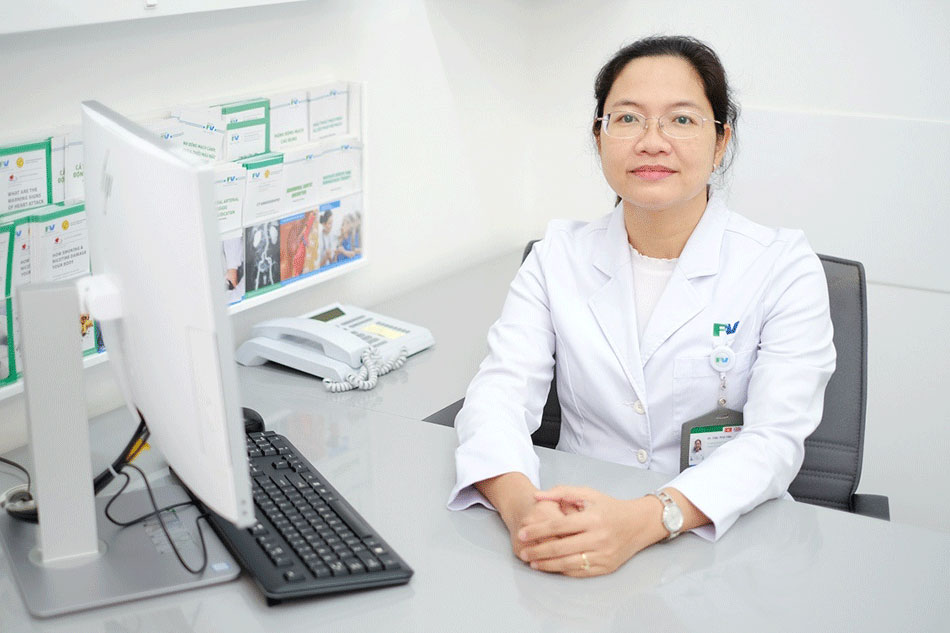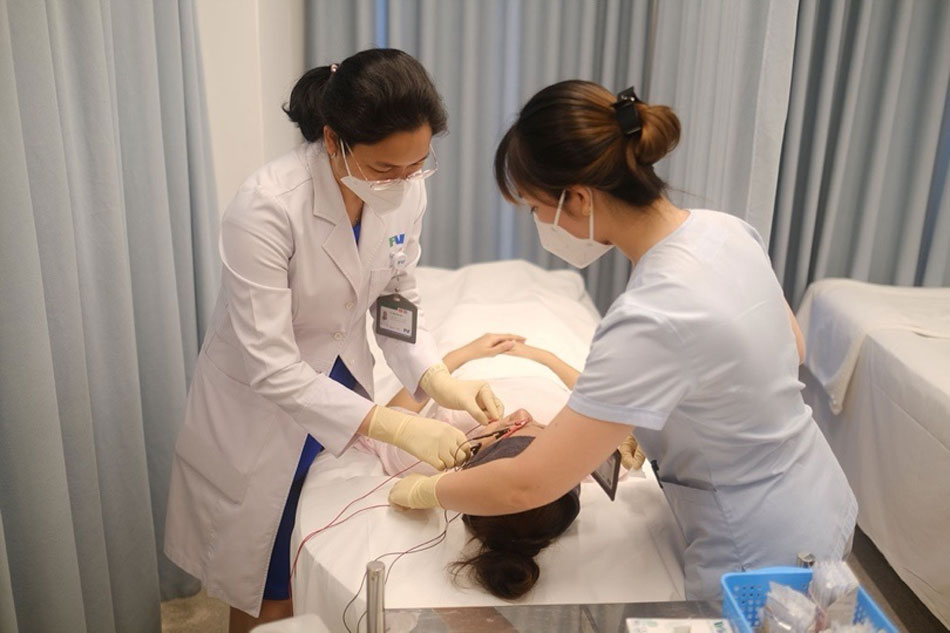Many patients with long-term insomnia have been effectively treated by a completely non-pharmacological method at the Traditional Medicine Department, FV Hospital.
Enjoy deep sleep again with catgut embedding therapy
Ms L.K.D. (37 years old, living in Long An) had trouble falling asleep for a long time. She often had difficulty sleeping, tossing and turning until 11 or 12 o’clock at night, only to wake again at between 2 a.m. and 3 a.m. and be unable to go back to sleep. In April 2021, Ms D. was diagnosed with breast cancer.
After the surgery and taking cancer medication, she hardly slept at all. She did not feel sleepy all day, and experienced debilitating headaches. Ms D. did not want to become dependent on sleeping pills, so asked her relatives for treatment recommendations, and was referred to Dr Diec Kha Han, Head of the Department of Traditional Medicine, FV Hospital.

Dr Diec Kha Han examines a patient suffering from insomnia
At first, Ms D. wanted to be treated via acupressure massage because her body was weakened by cancer and prolonged insomnia. The results were not satisfactory, so acupuncture treatment was added. After 10 electroacupuncture sessions, Ms D. had fewer headaches and slept better, so she stopped treatment. However, the effect only lasted about four months. At this time, Dr Han advised her to undergo catgut embedding and the results exceeded expectations.
“After having threads implanted twice, my headache was gone and I slept for a long time, from 9 p.m. to 5 a.m. the next morning. I hadn’t had such a deep sleep for ages. After five implantation sessions, I was sleeping well and I haven’t had a headache for more than a year,” says Ms D.
Treatment of insomnia requires its causes to be carefully examined
Dr Han said that the number of patients coming to FV Hospital for examination and treatment for insomnia is increasing, their age range skews younger and there is usually no physical illness associated. Causes of insomnia can be divided into two main groups: due to physical illness and non-physical illness.

Dr Diec Kha Han
In the physical illness group, insomnia often occurs in people with cardiovascular, musculoskeletal, respiratory, digestive, or neurological disorders such as anxiety disorders and depression.
The group without physical illness is comprised of those who are often stressed, anxious; who consume a lot of tea, coffee, tobacco; and people who do not do physical activity during the day. People who have a habit of going to bed too late and getting up too late, or using portable entertainment devices, computers or watch TV continuously for a long time, may also have sleep disorders, leading to insomnia.
Patients with insomnia often have symptoms of restless sleep, insufficient sleep (fewer than eight hours a day), difficulty falling asleep and staying asleep, or waking up easily and having difficulty falling back to sleep. Over time, insomnia leads to decreasing quality of life, difficulty concentrating, impaired memory, and negatively impacted work and study ability.

At the Traditional Medicine Department of FV Hospital, patients are usually treated with massage, acupressure, acupuncture, electroacupuncture or catgut embedding.
Depending on the cause of insomnia, patients will be prescribed different treatment. Patients with insomnia due to illness will be treated in combination with appropriate faculties. People with insomnia not due to illness or age will be consulted to adjust their sleep habits. If it’s difficult for patients to adapt in the early stages, traditional medicine techniques can be applied to make it easier for them to fall asleep.
Traditional medical methods affect acupuncture points under the skin, helping the body to produce endogenous chemicals such as opioids and serotonin, which have sedative and pain-relieving effects, helping patients to feel more comfortable and make it easier for them to fall sleep. Generally, the implant method is only prioritised for those who have long-term insomnia or cannot afford to go to acupuncture therapy every day.

FV uses PDO bio threads that dissolve within six to eight months of subcutaneous implantation. The procedure ensures sterility, and that no irritation occurs. Results can be maintained for up to 18 months.
The method only needs to be performed five to eight times per course, and effects are longer and more continuous than those achieved via acupuncture. FV Hospital’s Traditional Medicine Department has successfully used this method to treat many cases of chronic insomnia and insomnia due to side effects of medication.
It is especially important to note that the method of catgut embedding needs to be performed during a safe, infection-free procedure by qualified doctors in order to avoid risk of infection. Missing the correct embedding area or improper embedding depth can reduce the effectiveness of the treatment and affect the patient’s health.
At FV Hospital, infection controls are maintained and specialised equipment is strictly tested according to JCI International medical quality standards. Our team of experienced doctors and nurses are trained to ensure optimal treatment effects and complete patient safety.
Contact FV Hospital’s hotline (028) 54 11 33 33 for advice on insomnia treatment.

 Vi
Vi 












